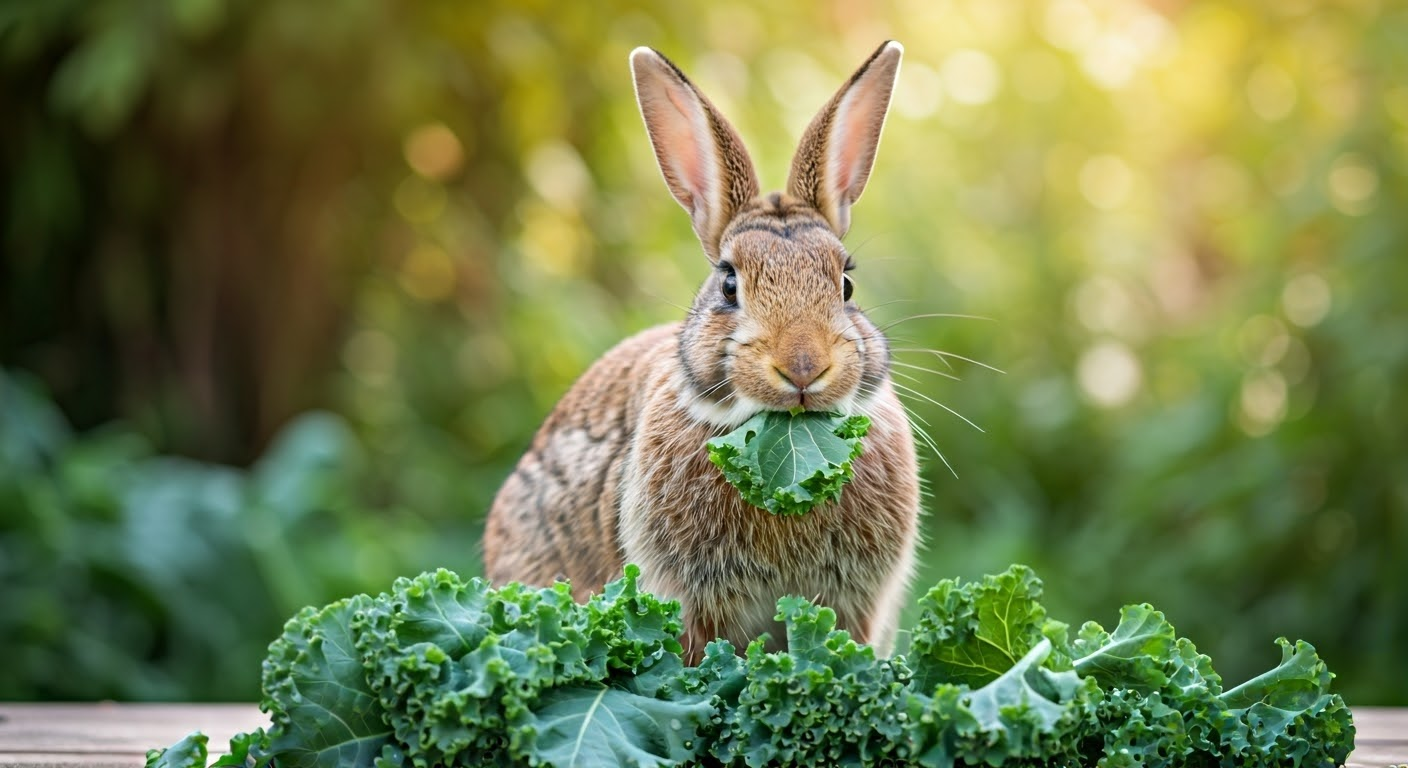Kale can be a good food for rabbits if given in moderation. It has a lot of calcium, which can cause problems like bladder sludge or kidney stones if rabbits eat too much. Instead of making kale a regular part of their diet, it’s better to treat it as a special snack.
Key Highlights
- Some people might think otherwise, but kale can be safe for rabbits.
- Kale has a lot of fiber, plus vitamins A, C, and K. It also contains important minerals.
- To feed kale to rabbits, do it in moderation and gradually introduce it.
- Eating too much kale can be risky, especially for rabbits that have urinary problems.
- Always talk to a veterinarian for advice on your rabbit’s diet.
- A balanced diet is important. It should have different fresh vegetables, unlimited hay, and fresh water.
Adding a variety of fresh vegetables to your pet rabbit’s diet is important for their health and happiness. Many rabbit owners wonder if kale is good for their rabbits. This guide will explain the facts about kale and its place in a pet rabbit’s diet. It will also address common concerns and provide practical tips to help your fuzzy friend enjoy eating kale safely.
Debunking Myths: The Truth About Kale and Rabbit Health

For a long time, people believed that kale was harmful to rabbits. They thought this because kale has calcium, oxalates, and goitrogens. However, recent studies show that this idea might not be correct. Just like collard greens, kale can be a nutritious addition to a rabbit’s diet if fed in moderation and with safe practices.
It is important to get the latest information and talk to veterinarians for professional advice about rabbit care and nutrition. This will help you clear up myths and make good choices for your pet’s nutrition. Remember, every rabbit is different. What is best for one rabbit may not be right for another.
Addressing Common Concerns: Calcium and Oxalates
One enormous concern about kale is its calcium content. A lot of calcium can cause urinary problems in rabbits, like kidney stones. However, calcium is also important for rabbits. It helps keep their bones strong. They get rid of the extra calcium through their urine and other body systems.
Oxalates are common in many plants and can be a concern. Recent studies show that kale has less oxalate than other leafy greens that rabbits eat, such as parsley, spinach, and dandelion greens. The amount of calcium in these greens is also an important factor to think about.
If your rabbits have urinary issues, it’s a good idea to limit their kale. This is because kale has high calcium and oxalate levels. But, you don’t have to cut it out completely. A balanced diet is the best. Avoid giving them broccoli too. Make sure they drink enough water and get regular exercise. These steps can help prevent urinary problems in rabbits.
The Importance of Diet Variation for Rabbit Wellness
Rabbits are like people. They feel better with a varied diet that has mint. They need several important nutrients. A mix of different vegetables and lots of hay helps keep their nutrition balanced.
Mixing up their food helps prevent digestive upset for bunnies. If rabbits eat too much of the same food, they can have problems. When you add new vegetables, do it slowly. Monitor how your rabbit reacts. This is important, especially with kale.
By offering them a cheerful variety of veggies, you enhance their nutrition. It also makes mealtime enjoyable and exciting for them. This is important for keeping them healthy and happy.
The Nutritional Advantages of Including Kale in Your Rabbit’s Diet

Kale is not just good for you; it is also an important food for your rabbit. This leafy green is packed with vitamins, minerals, and fiber, which help keep your rabbit healthy. When served the right way, kale can be a significant part of a balanced diet for your pet.
The nutrients in kale help your rabbit digest food better and support their immune system. They are key to keeping your rabbit fit and healthy.
Highlighting Kale’s Rich Fiber Content
One great thing about kale is that it has a lot of fiber. This fiber is very important for keeping a rabbit’s digestion healthy. It helps their gut work well, makes digestion easier, and can prevent problems like stasis.
Grass hay, like timothy hay, should be the major food for rabbits. It is rich in fiber. You can also add some kale and other leafy greens in smaller quantities. This adds variety to their fiber intake. A varied diet is good for keeping their gut healthy.
Eating foods high in fiber, like kale, helps digestion. It also prevents constipation. This helps your rabbit’s digestive system work better.
Essential Vitamins in Kale That Benefit Rabbits
Kale is good for rabbits. It has fiber and many key vitamins. An enormous benefit is that it is a significant source of vitamin A. This vitamin helps keep their eyes, skin, and immune function healthy.
Kale has vitamin C, which is a powerful antioxidant. This vitamin supports a rabbit’s immune system, helping it resist infections and stay healthy. Although rabbits can produce their own vitamin C, feeding them nutritious foods like kale ensures they receive enough.
Adding small amounts of kale, along with other veggies that are rich in vitamins, is good for your rabbit’s health.
Guidelines for Introducing Kale to Your Rabbit
When you want to add new food to your rabbit’s diet, do it slowly. This will help prevent any digestive upset. Kale has many good nutrients, but you should still add it step by step. Follow these tips to safely include kale in your rabbit’s meals.
How to Properly Prepare Kale for Safe Consumption
Before you give kale to your rabbit, prepare it first. This helps make sure it is safe and tasty for them. Use fresh, organic kale if you can. This helps lower the chances of pesticides. If you wouldn’t eat it, then it’s not good for your rabbit.
Next, wash the kale leaves thoroughly under cool running water. This will help remove dirt and tiny bits. If you like, you can also soak the leaves in a mix of water and vinegar for a deeper clean.
Recognizing the Signs of a Healthy Diet in Rabbits
Keeping an eye on your rabbit’s health and behavior is important. This helps you know how they are handling kale and if their diet is good. A rabbit that eats well will make regular, nicely shaped pellets and have light-colored, clear urine. They should also have a consistent appetite and stay active, noticing what is around them. It’s essential to watch for any adverse reactions, like excessive gas, when giving them kale.
Make sure your rabbit drinks clean water. This is essential for good digestion and health. If they don’t drink enough, it can lead to health problems. It is best to change their water several times each day, especially during hot days.
Conclusion
In conclusion, kale can be a good choice for your rabbit if you give it in moderation. It should be part of a mix of other foods, like dill. It is important to know that too much kale is not good. A varied diet with fiber and essential vitamins can help your rabbit stay healthy. You should prepare the kale the right way and keep track of how much your rabbit eats. Be careful about calcium and oxalate levels to keep them well. Always watch for signs of a healthy diet in your rabbit. Talk to a veterinarian for advice on the best diet for your furry friend. A varied and well-managed diet is key for your rabbit’s health.
Frequently Asked Questions
What quantity of kale is safe for my rabbit?
It’s a good idea to give your rabbit small amounts of kale. Try offering one or two leaves at first. Watch your rabbit closely for any adverse reactions. If everything looks fine, you can slowly give more. Just remember to keep it moderate. It’s smart to talk to your veterinarian for guidance based on your rabbit’s breed, size, and health. Eating too much food, even safe ones like kale, can upset a rabbit’s sensitive stomach.

Hi, I’m Sondip,
I’m a writer who loves to help people solve their problems. I write about small animals like mice and other small animals and even pests.

